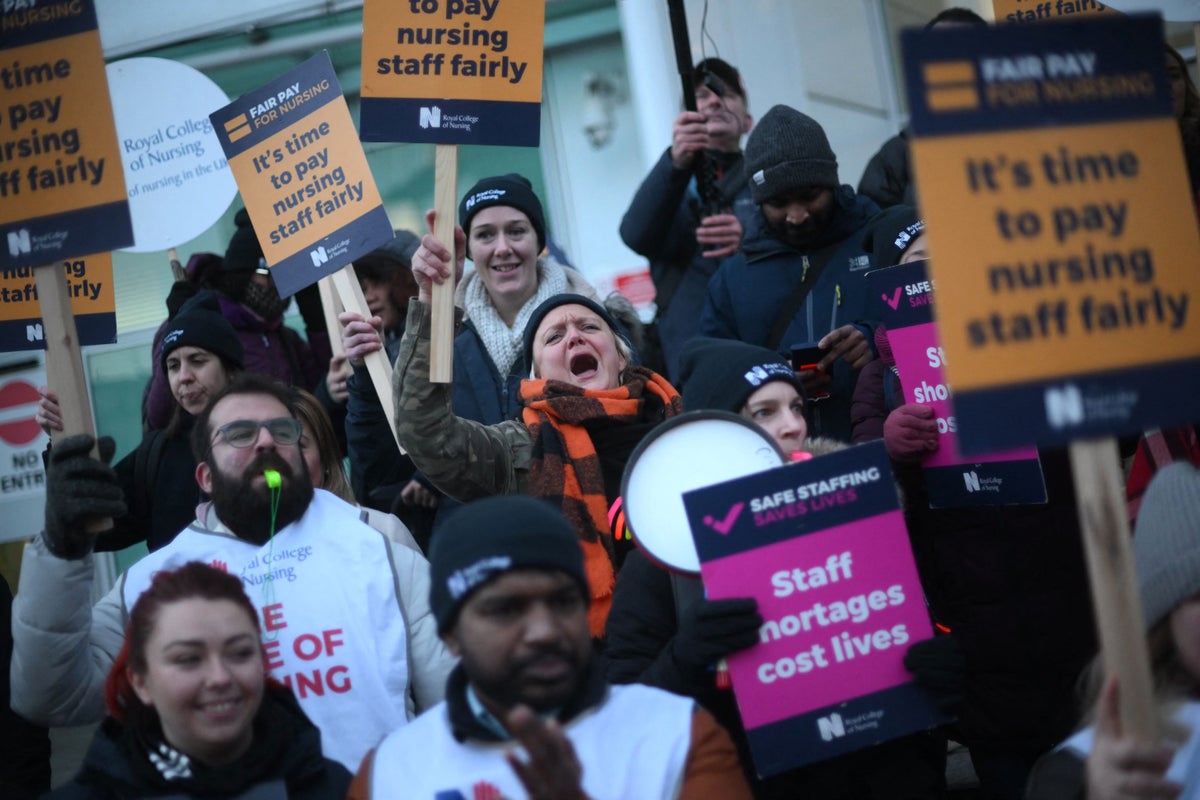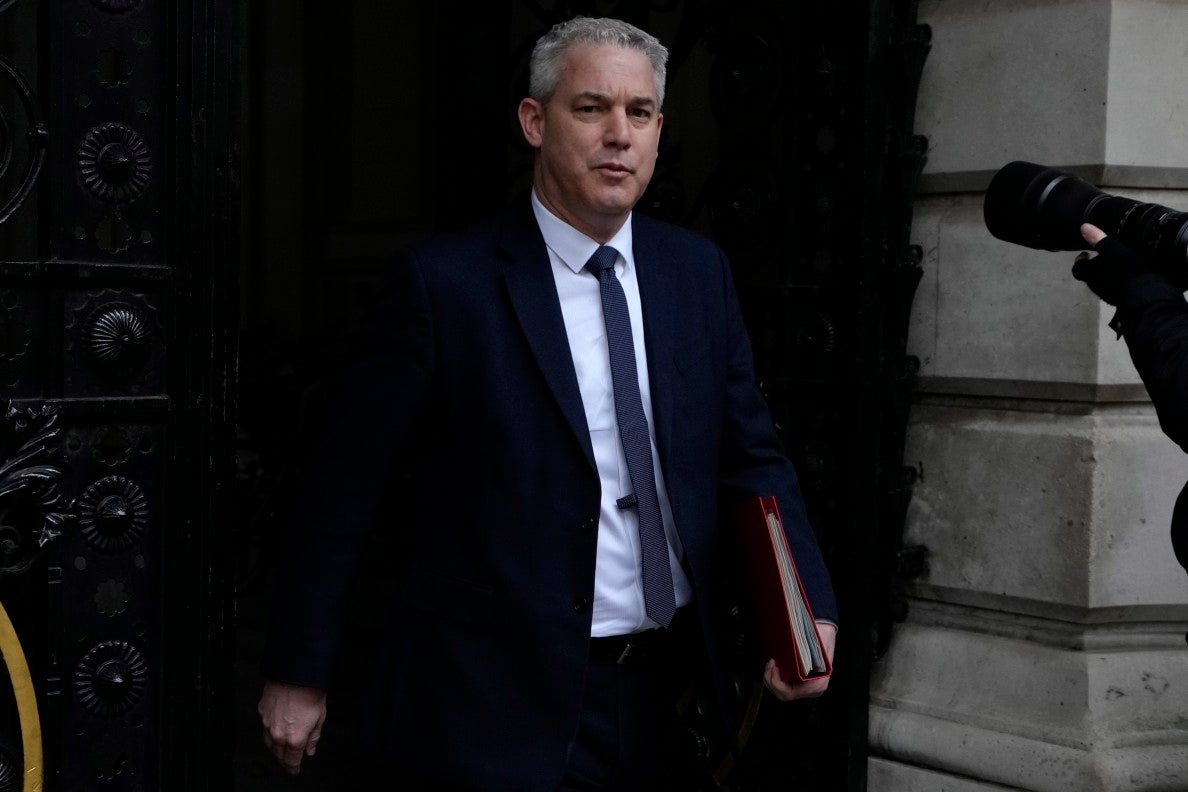
Nurses have rejected the government’s pay offer and announced an all-out strike with all services affected for the first time in NHS history.
A majority of Royal College of Nursing (RCN) members rejected the 5 per cent pay deal, by 54 per cent of the vote to 46 per cent, despite a recommendation from union leaders to accept it.
In a bid to force the government’s hand, the union announced a round-the-clock walkout for 48 hours starting at 8pm on 30 April until the evening of 2 May.
Unlike during previous strikes, the stoppage will involve nursing staff working in emergency departments, intensive care units, cancer care and other services that were previously exempt.
It comes as around 47,000 junior doctors finished their 96-hour strike in a separate dispute over pay at 7am on Saturday.
In the letter to health secretary Steve Barclay, RCN general secretary Pat Cullen warned that the government’s existing pay offer was “simply not enough”.
“After a historic vote to strike, our members expect a historic pay award,” she said.
There was some good news for the government on Friday, however, as Unison announced that its 150,000 health workers, including cleaners, porters, paramedics, as well as some nurses, would accept the offer.
The announcement of further strikes by the RCN comes as 47,000 junior doctors walk out in a four-day stoppage.
The deal rejected by the RCN included a one-off payment of at least £1,665 and a 5 per cent salary increase next year.
Announcing the fresh strike action, Ms Cullen said: “The government needs to increase what has already been offered and we will be highly critical of any move to reduce it.
“Since our talks in February, we have seen the pressures on the NHS continue to increase. The crisis in our health and care services cannot be addressed without significant action that addresses urgent recruitment and retention issues and nursing pay to bring this dispute to a close urgently.
“Until there is a significantly improved offer, we are forced back to the picket line. Meetings alone are not sufficient to prevent strike action and I will require an improved offer as soon as possible. In February, you opened negotiations directly with me and I urge you to do the same now.
The government said the escalation of strike action was “hugely disappointing” and “concerning for patients”.
Adam Brimelow, director of communications at NHS Providers, which represents health trusts, described the vote by nurses as “a setback” and “extremely worrying”.
“Safe and effective patient care, the top priority for NHS trust leaders and staff, is harder to guarantee amid escalating strikes,” he said.
“This week’s four-day walkout by junior doctors has seen hundreds of thousands of appointments and procedures postponed and staff cover spread too thinly despite trusts’ best efforts to manage the risk. Trust leaders understand the frustration of nurses, junior doctors and other staff who have seen their pay fall behind inflation year after year.

“It’s really important that the unions and government find a way through this to prevent more strikes and let the NHS focus on its big challenges including cutting waiting lists and transforming services, instead of having to resort to ‘all hands on deck’ just to get through the day.”
Ministers say healthcare workers’ demands are not affordable. Nurses had previously asked for a 15 per cent rise to exceed inflation – a move they said would stop their real pay from being eroded and also help with the NHS recruitment and retention crisis.
Liberal Democrat health spokesperson Daisy Cooper called on ministers to “get back around the table”. She said: “The Conservatives have already plunged the NHS into crisis, and their bungling of pay negotiations is only making things worse.
“Whether or not there are more strikes, far too many patients across the country are waiting hours for an ambulance or to be seen in A&E, and months to start urgent treatment for cancer.
“Ministers must get back round the table to agree a fair deal, put an end to the strikes, and bring forward an urgent NHS rescue plan so patients get the care they deserve.”
And Labour MP Richard Burgon said the government “must start listening to nurses”.
He told The Independent: “The government now needs to come forward with the kind of inflation-proofed pay offer that could avoid a new round of strikes and that begins to tackle the tens of thousands of nursing vacancies that we have in the NHS.”
But Tory MP Craig Mackinlay said the offer rejected by nurses was “fair” and “far better” than what most private sector workers have experienced.
Mr Mackinlay told The Independent: “The government’s latest pay offer to nurses is a fair one. Some 46 per cent of members taking part in the ballot similarly thought so as well. It is disappointing that the impasse continues meaning more appointments cancelled and further treatment delays. This action simply must stop with public support now waning.”
Sara Gorton, from Unison, whose members voted to accept the pay offer, said: “Clearly health workers would have wanted more, but this was the best that could be achieved through negotiation.
“Over the past few weeks, health workers have weighed up what’s on offer. They’ve opted for the certainty of getting the extra cash in their pockets soon.”
A government spokesperson said: “It is hugely disappointing that the Royal College of Nursing membership has rejected the pay deal recommended by their leadership. Following constructive discussions, all parties agreed this was a fair and generous offer which is demonstrated by Unison, representing the largest share of the NHS workforce, choosing to accept it.
“The fact that the Royal College of Nursing has announced an escalation in strike action with no derogations, based on a vote from the minority of the nursing workforce, will be hugely concerning for patients.
“Hundreds of thousands of Agenda for Change staff continue to vote in ballots for other unions over the next two weeks and we hope this generous offer secures their support.”







